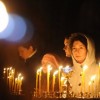On the day before the Feast of Ascension, the celebration of Christ’s ascension in the flesh from Mount Tabor to the right hand of the Father, we prepare for the feast by first commemorating the Leave-taking of Pascha. For our intent has been, as the Church, to have immersed ourselves in joy and gratitude since the day of holy Pascha, the celebration of Christ’s life-giving Resurrection, until its Leave-taking. On the Leave-taking, the clergy serve fully vested, sing the Paschal hymns, carrying the three-candled trikyri, and singing “Christ is risen!” as if it is once again holy Pascha itself.
With vespers and matins of Ascension, we begin the shift in emphasis from the astounding and incomprehensible wonder of Christ’s triumph over death to the very personal and inexplicably loving event of His ascension, that is, His physical conveyance in our human flesh, from being with His disciples on Mount Tabor to the right hand, outside time and space, of the Father. In His loving condescension, God did not only assume human flesh in order to redeem mankind from our debt of death, but also took that flesh into the very presence, and sharing in the very attributes, of the Holy Trinity, that the love He desired to share with man would be made perfect—having “destined us for adoption as His children through Jesus Christ, according to the good pleasure of His will” (Eph. 1:5).
Having sung “Christ is risen!” for forty days, we the Church now stand in awe and in silence, left speechless in our feeble contemplation of what Christ has accomplished and the mystical opportunity to which we have been invited. Man, in a manner possible only through the will, humility, and love of the Divinity, is now invited not only to be with God, but to be like Him to a degree of similarity that renders him indistinguishable to the outside observer—sons and daughters of God. Dumbstruck by the realization of this dawning reality, we no longer even sing “Christ is risen!” There are no words to describe what Christ has even further accomplished on our behalf in His ascension. We stand rather in silence and contemplate the promise that He has asked us to wait to see fulfilled: “I will pray the Father, and He shall give you another Comforter, that He may abide with you forever” (John 14:16).
Therefore, from Ascension to Pentecost, we contemplate the Resurrection, Ascension, and coming gift of the Holy Spirit in the silence of unexplainable and unearned love. We do not pray “O Heavenly King,” for the Holy Spirit is a gift that at one time we not only did not have, but could not have, yet Christ, in fulfillment of the will of the Father, has given Him to us. Let us not forget or take for granted that gift.
Christ has Ascended!

















